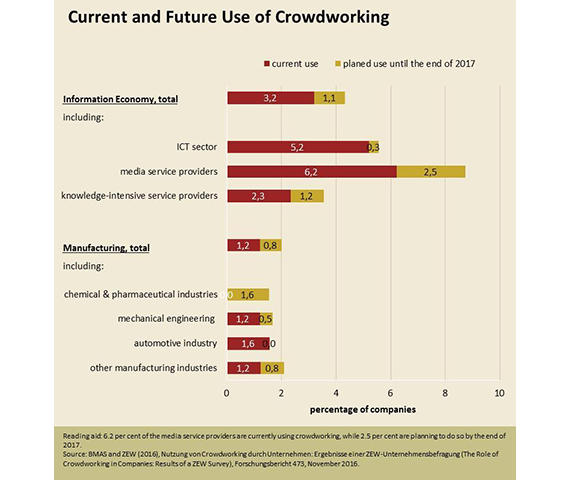Crowdworking Platforms Not Yet Widely Used
ResearchCrowdworking – i.e. the allocation of usually internal business tasks and projects via online platforms to external workers, who are paid to perform those tasks – has become a well-known concept among German businesses in the manufacturing industry and information economy. The share of businesses actually using crowdworking platforms, however, is very small – well below 5 per cent. Compared to the results of the first survey conducted on that issue in 2014, this figure has remained almost unchanged. This is the result of a representative survey among businesses carried out by the Centre for European Economic Research (ZEW), on behalf of the Federal Ministry of Labour and Social Affairs (BMAS) in September 2016.
The survey, which was performed among businesses in the manufacturing industry and information economy (comprising the information and communication technology sector, media service providers and knowledge-intensive service providers) shows that crowdworking, a rather new concept in the digital working world, has gained a considerable level of awareness in the past few years. In 2014, merely 55 per cent of the companies in the information economy were familiar with the concept. Today, the share of businesses acquainted with crowdworking exceeds 75 per cent. Crowdworking is also well-known among businesses in the manufacturing industry, with 70 per cent of the companies stating to be familiar with the concept. Nevertheless, the use of crowdworking platforms is still rather uncommon among the surveyed industries. Similar to 2014 levels, merely 4 per cent of businesses in the information economy stated that they currently use, or are planning to use crowdworking next year (see graph at the bottom of the press release). Among businesses in the manufacturing industry, allocating tasks via online platforms is even more uncommon, with approximately 2 per cent of businesses engaging crowdworkers.
Factors impeding the use of crowdworking
According to the businesses, one reason why crowdworking is rarely used is the fact that the company's work contents are not suitable to be crowdsourced. Other factors impeding the use of crowdworking include risks associated with sharing internal knowledge as well as difficulties concerning the quality control of tasks completed via online platforms.
As expected, firms that have already hired freelancers on the basis of service contracts are also much more likely to allocate tasks to crowdworkers.
The number of firms envisaging possible applications of crowdworking in their firms is significantly higher than the number of firms actually using it. Quite surprisingly, the mechanical engineering and manufacturing sector, and the knowledge-intensive services sector record a similar share of businesses which see potential fields of application for crowdworking (11 and 13 per cent). In this regard, the survey revealed that, in the future, the use of crowdworking models might not be limited to the services sector.
For more information please contact:
Dr. Jörg Ohnemus, Phone +49(0)6211235-354, E-Mail ohnemus@zew.de

